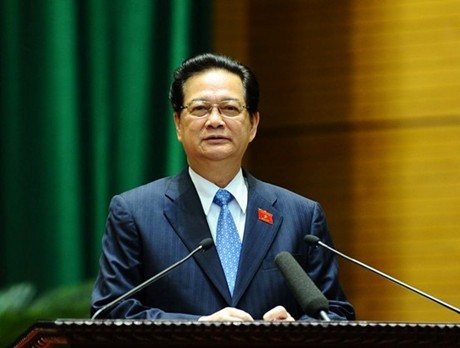(VOVworld) – The 13th National Assembly’s 6th session wrapped up a 3-day Question and Answer session on Thursday. Various pressing issues were put on the table. Deputies posed straightforward questions and the cabinet members answered them sensibly. The Q&A session demonstrates the reforms in the National Assembly’s supervisory work and the government’s determination to fulfill its socio-economic targets.

Photo: VGP/Nhat Bac |
The Q&A session has always drawn the public’s keenest interest at National Assembly meetings. It is considered a vote of confidence in the ministers and an evaluation of the National Assembly’s performance.
Renovations
This Q&A session saw a number of changes. The deputies had 3 days to question cabinet members instead of 2 and a half days as in previous Q&A sessions. This was the first time the National Assembly reviewed the implementation of cabinet member commitments made at previous meetings. The session was open to ministers who were not on the query list to elaborate urgent issues of voter concern. National Assembly Vice Chairman Huynh Ngoc Son comments: “The National Assembly’s discussion of the results of implementing resolutions issued at previous Q&A sessions is a change in the National Assembly’s supervisory work. This activity will bring practical results, resolve pending issues and shortcomings, fine tune the legal system, and meet the demands of National Assembly deputies and people’s aspirations.
Urgent issues discussed
The quality of the Q&A session depends 50% on the deputies’ questions. A range of pressing issues was brought forward including the planning and building of hydro-power plants, water sluices from reservoirs causing severe losses to people, the slackening of medical ethics, unjust trials, the effectiveness of anti-corruption effort, and the quality of state employees. In a speech summarizing the Q&A session, National Assembly Chairman Nguyen Sinh Hung said that issues selected for the Q&A session are urgent issues emerging from people’s lives which need to be resolved promptly.
The Prime Minister and Ministers representing the economic, social, and judicial sectors answered almost all the deputies’ questions. Another 7 Ministers also answered groups of questions on various topics. Deputy Bui Thi An, representing Hanoi, said: “In the previous session, Q&A received less attention than now. The questions and answers were made public. I think after this session, the National Assembly and the National Assembly Standing Committee will demand that the law enforcement sector strictly implement its answers to voters’ questions.”

Prime Minister Nguyen Tan Dung answered deputies' questions on Nov 21. (photo: VGP/Nhat Bac) |
Willingness to learn
The Prime Minister acknowledged deputies’ recommendations on socio-economic management and put forward some solutions. “The Government seriously considers good ideas by National Assembly deputies and voters nationwide and will continue to resolve weaknesses, improve management efficiency, and exert maximum effort together with the Party, people, and forces to fulfill the National Assembly’s resolutions.
Inquiry is the highest level of the National Assembly’s supervisory role. The Q&A session of the 6th session of the 13th National Assembly shows the National Assembly’s effort to reform to meet the demand of voters nationwide in resolving pressing social issues.